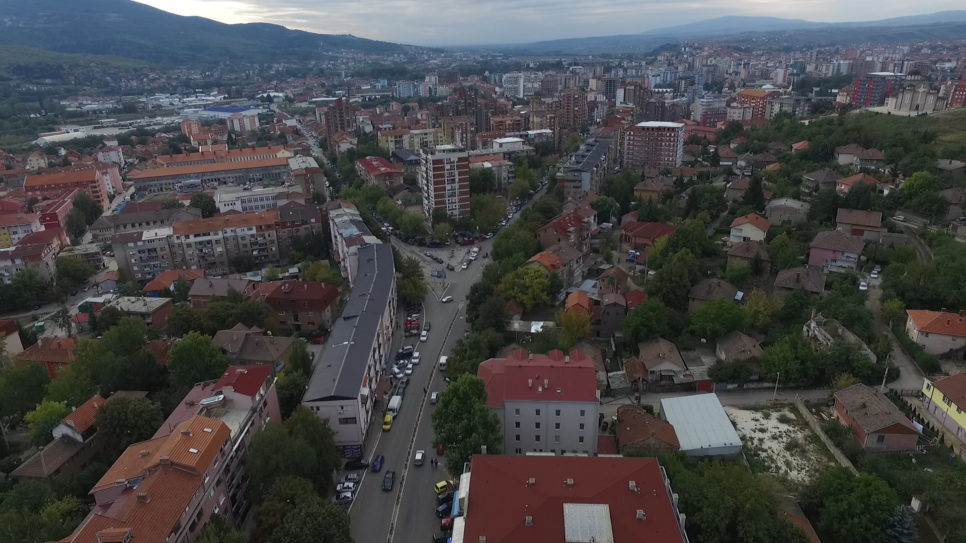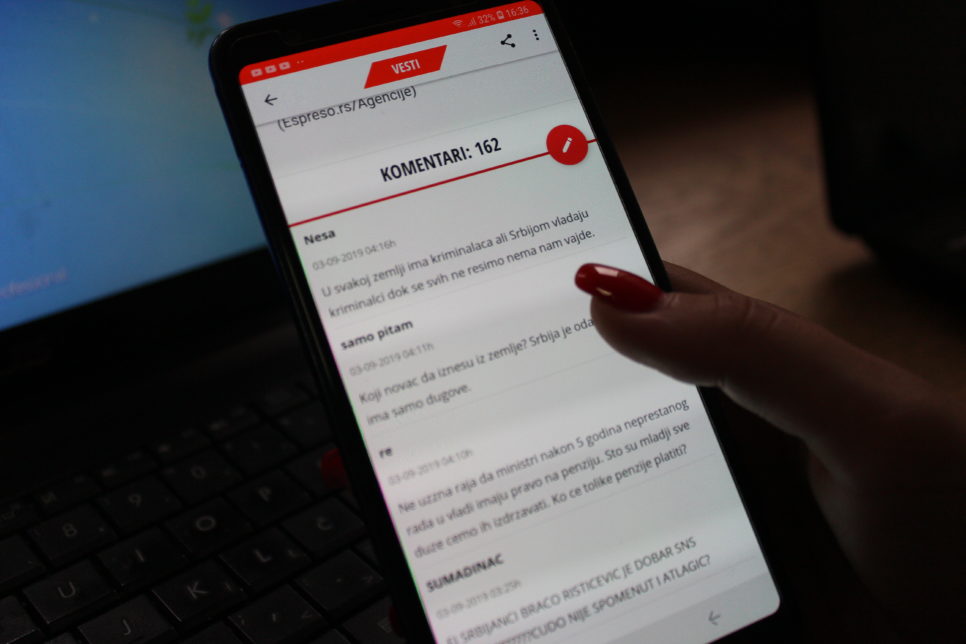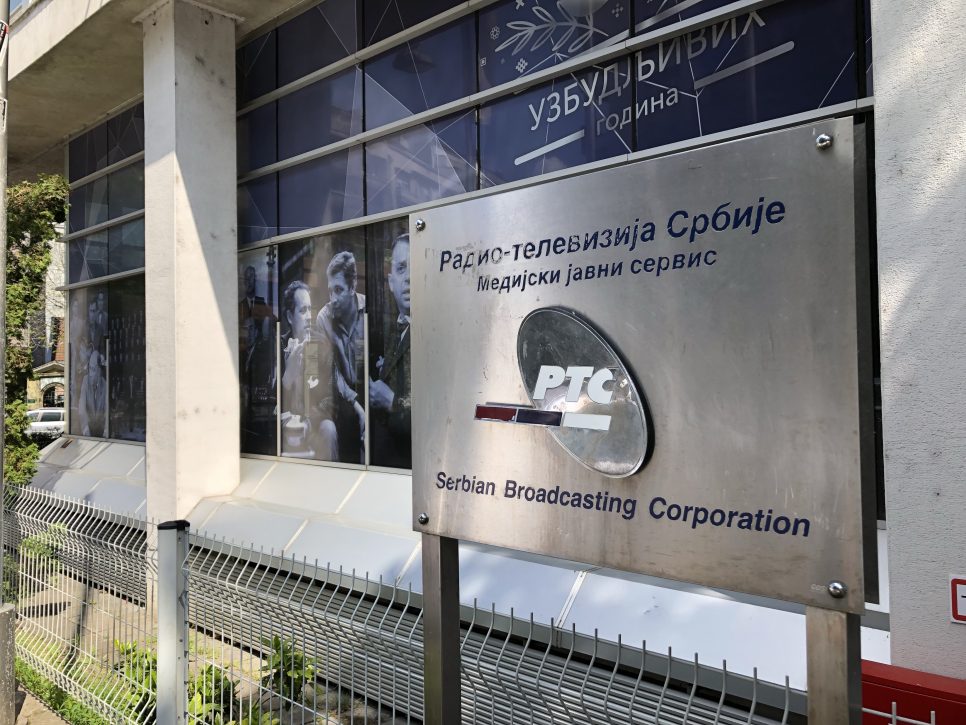The story CINS published on March 14, 2019 points out examples of unequal treatment by the Tax Administration in checking the founders of media in Niš and its vicinity, which can be linked to the editorial policy of a media outlet or its owner’s closeness to the state and local authorities. The focus was on the Južne Vesti website, which was subjected to several inspections and for much longer than other media, accompanied by unprofessional conduct by certain inspectors and the making of an illegal decision that identified an alleged violation of labor and tax regulations. An indicator of possible political influence is the fact that the last inspection ended after an appeal by the prime minister, made because the case had attracted a great deal of public attention. Even stronger confirmation is the fact that the enforced collection of the unfounded fine never happened.
The number of checkups in the media from 2012 to 2018 was unequal, nor could the rule according to which they were conducted be established. Journalists underscore that some televisions were not subjected to inspection at all after they were purchased by people close to the authorities. The annual revenue of certain media was not a criterion of the scope and number of checks either, as can be concluded from CINS’ data on the example of Južne Vesti and Kopernikus (the latter had 16 times more revenue, but the number of checks was the same).
The journalists also highlight the non-transparent work of the tax inspectorate, which provided the data requested only after the Commissioner for Information of Public Importance issued a decision ordering the institution to do so, as well as the consequences the state bodies’ unequal treatment has had for certain, now non-existent media.
Relevant Regulations
Tax Procedure and Tax Administration Act (Official Gazette of RS, No. 80/2002, 84/2002 – corr., 23/2003 – corr., 70/2003, 55/2004, 61/2005, 85/2005 – as amended, 62/2006 – as amended, corr. of other law, 61/2007, 20/2009, 72/2009 – as amended, 53/2010, 101/2011, 2/2012 – corr., 93/2012, 47/2013, 108/2013, 68/2014, 105/2014, 91/2015 – authentic interpretation, 15/2016, 108/2016, 30/2018 and 95/2018) is the main regulation the implementation of which is monitored in CINS’ story. Other regulations present, to a lesser extent, are the Inspection Oversight Act and regulations that are binding for media founders.
Inspection Plans
According to the Act (Article 118), tax inspection is carried out on the grounds of an annual plan enacted by the director of the Tax Administration, which is based “on the estimate of tax relevance and tax risk of the taxpayer,” as well as on the grounds of an extraordinary plan. When making the plan, “the assessment of impact of tax inspection on the efficiency of tax collection in certain business activities must be taken into account.” Extraordinary plans are enacted “in cases where there was a market disruption or if there is indication of increased volume of illegal trade.” This plan is enacted by the finance minister.
Inspection Procedure
The Tax Administration delivers a field inspection order to the taxpayer right before the start of inspection. In some cases (e.g. inspection of recording turnover through fiscal cash registers), inspection is carried out with prior delivery of an order. The start of inspection may be delayed based on a verbal objection (Article 124).
Inspection is performed “at the office of the taxpayer, on the official premises of the Tax Administration or elsewhere, depending on the subject of inspection.” The taxpayer shall, if the tax check is being carried out at their office, secure an appropriate place for the tax inspector to work in. Upon court approval, the tax inspector is also allowed to enter the taxpayer’s apartment, for the purpose of conducting inspection (Article 125).
Tax inspection is carried out during the taxpayer’s working hours, and in extraordinary cases after the working hours, as required by the purpose of inspection or if the taxpayer agrees thereto (Article 126).
The taxpayer shall take part in establishing facts and provide information and statements at the request of the tax inspector. The taxpayer shall give the tax inspector access to the state of goods, as well as access to business books, records and other documentation or documents. The tax inspector may also request data, i.e. access to documentation from the taxpayer’s employees or other persons (Article 127).
It is already evident from these selected provisions of the Tax Procedure and Tax Administration Act that being subjected to inspection alone, especially when it takes a long time, is a conspicuous strain on the work of the media. Particularly affected are media outlets with a small number of administrative employees, which is the case with most media. In such circumstances, not being subjected to inspection gives certain media an advantage over controlled competition, which is the most noticeable at the local level.
The elements for defining an inspection plan contain no guarantees that all similar entities will be subjected to inspection to a similar extent, be they entities operating within the same branch, in the same city or town, or with a similar volume of business.
Tax and Other Regulations
The Tax Procedure and Tax Administration Act envisages a very limited possibility of implementing other regulations. Article 3, paragraph 1 states the absolute supremacy of the Tax Procedure and Tax Administration Act: “If another act regulates differently a matter in the area regulated by this act, the provisions of this act shall apply.” Paragraph 2 points out that (“unless otherwise provided by this act”) the tax procedure is carried out “according to the principles and in line with the provisions of the act regulating general administrative procedure, i.e. in accordance with provisions of the act regulating inspection oversight.” This creates at least a small possibility of implementation of some good principles from the Inspection Oversight Act.
Inspection and Media
General Framework and the Inspection Oversight Act
Parts of the Transparency Serbia investigative report unveiled in May 2018 were used in this chapter.
Research conducted by Transparency in 2018, on the subject Inspections and the Media pointed out that discretionary authority was one of the main sources of corruption, while a lack of transparency was a factor that enabled abuse of such authority to stay hidden. The work of inspection bodies in Serbia, in line with the law passed in 2015, created possibilities for reducing the risk of corruption, because it contains provisions aimed at ensuring that the work of inspectors in checking business entities is more transparent and predictable. Those risks were not completely eliminated by legal norms, but some rules make it easier to track them.
Corruption in inspection work is tied not only to bribing individuals, but also to the original decision to include or not include a particular entity in the inspection plan or extraordinary inspection. Sometimes these decisions are not based on solid criteria, but rather on the discretionary decision of an inspector or their superior. That type of potential bias is not subjected to appropriate oversight by supervisory bodies, nor can the subject of inspection oversight complain about potentially unequal treatment in that regard.
While the government and local self-government units publicize information on the funds they have earmarked for financing media programs of public interest from the budget, information on inspections of media carried out by state bodies is not similarly available. That lack of information fuels suspicion that media outlets are not treated equally, but rather that state bodies are used as an instrument of pressure on editorial policy. Also, advertisers in the private sector are allegedly subject to similar selective checks.
The Action Plan for Chapter 23 of Serbia’s negotiations with the EU and the national anti-corruption document do not comprehensively deal with the problem of corruption in inspection bodies.
The Inspection Oversight Act (Official Gazette of RS, No. 36/2015 and 44/2018 – as amended) came into force in April 2016. It serves as a framework regulation for all inspection procedures; transparency was increased through the publication of inspection plans and checklists on inspectorates’ websites; lists of legal entities who do not abide by applicable regulations are to be publicized on inspectorates’ websites; written notification of an inspector’s visit is given in advance; inspectors’ powers were expanded.
The inspected companies’ level of conformity with the regulations is assessed by checklists. A checklist is a document that contains a list of priority inspection issues and other actions for which the inspectorate is authorized, defined by the severity of potential harmful consequences in a particular area, in compliance with the rules of risk assessment, and the subject and scope of inspection. Each inspectorate must put together checklists in their own area, post them on their website and apply to the regular inspection procedure.
Uselessness of Reports and Plans
The aforementioned Transparency research reviewed the Tax Administration’s available reports and plans. TS failed to find any plans and reports on the work of the tax inspectorate on the Tax Administration website, nor did it receive any based on a request for information of public importance. The Report on the Work of Field Inspectors for 2017 was the only report found on the Coordination Commission for Inspection Oversight webpage. The document in question is not very large (six pages). The document lists the regulations based on which the Tax Administration conducts checks, the three possible types of checks and what each of them entails. It recalls the powers of the Tax Administration and the organization of regional units – there are 78 branch offices in total within four regional centers, and a Large Taxpayers’ Office, which are in charge of overseeing some 450,000 taxpayers. Inspections are carried out by 490 inspectors, and 783 jobs in total are systematized. The report reads that 11,790 checks were conducted and that irregularities were found in almost 40% of cases, after which requests for initiating misdemeanor proceedings were filed. Inspections of unregistered entities were conducted in 189 cases. Checks were carried out as regards recording turnover through fiscal cash registers, at dental offices, importers and traders of plants, and as regards the illegal tobacco products trade.
According to this report, the Tax Administration in collaboration with other inspection bodies checked taxpayers operating in the purchase, processing, packaging and sale of honey and raspberries, and in organizing celebrations and games of chance. Joint checks were also conducted with the labor inspectorate in the case of 67 taxpayers, while fiscal cash registers at 99 hospitality venues were inspected in collaboration with the Interior Ministry.
As far as compliance with the plan is concerned, the Tax Administration underlines that checks were planned “based on the risk analysis criterion, based on presence in activity sectors,” VAT return and loan repayment inspections, based on risk analysis and on official notes of the tax police, on reports by known and unknown persons and other state bodies and organizations. The report says that, based on the risk analysis conducted in 2017, taxpayers operating in a total of 12 listed fields were inspected.
The report does not contain any additional data based on which a conclusion could be drawn as to the level of work plan fulfillment, or as to the total number of times other bodies, known and unknown persons addressed the Tax Administration.
Rejection of Request
TS requested work plans for 2015, 2016 and 2017, and work reports for 2015 and 2016 from the Tax Administration. We received a decision stating that the request was rejected due to the overly large amount of information, because “an additional analysis would need to be carried out per field inspectors, of whom there are 500, and data would need to be summarized by each organizational unit so that they would be analytical and in line with the request.” The reply further reads, verbatim: “Plans and reports are done globally, as a whole, as well as by each unit, and separately reports, each of which individually contains a particular parameter which is observed for the purpose of examining work efficiency, days, weeks, months, number of inspections, effects… Thus, acting on the aforementioned requests would use up a lot of time, require disproportionately great efforts by the body in handling the task and would engage a large number of employees, who by doing this job would have to put aside and neglect their regular obligations.”
This reply implies that the Tax Administration cannot meet its legal obligation of making and publicizing an annual work plan and work report.
TS filed complaints to the Commissioner. At the same time, we submitted an additional request to the Tax Administration, in an attempt to determine what some of the nonsense from the Tax Administration’s reply meant. So, instead of requesting documents and “analytical data” (which was not the subject of the initial request in the first place), we requested information on what annual plans and reports the Tax Administration had “globally and as a whole” and “individually” (terms used by the Tax Administration in its reply) for 2015, 2016 and 2017.
We also requested that the Tax Administration say how many individual work plans and reports it did not consider an overly large amount of information which could be delivered to us. A request was also made for the work reports and annual work plans of the field inspectors for the City of Niš for 2015, 2016 and 2017.
Although it previously claimed to be in possession of more than 500 individual reports on the work of field inspectors, in a decision on the new request the Tax Administration said it did not have the work reports and annual plans of the field inspectors for the City of Niš for 2015, 2016 and 2017. At the same time, the Tax Administration rejected the first two requests, citing provisions of the Tax Procedure and Tax Administration Act which regulate the secrecy of procedure. In that way, the Tax Administration declared secret even the piece of information on how much information it did not consider too big to deliver as requested!
We filed a complaint to the Commissioner against this decision, too. In the complaint, we pointed out that in its decision the body cited Article 9, paragraph 1, item 5 of the Law on Free Access to Information of Public Importance, i.e. that the data requested were set to be kept secret. In the process, the governing body did not act in accordance with the provisions of Article 8 of the Law, i.e. did not measure whether, in this particular case, in a democratic society it was necessary to deny the right to access information for the sake of protecting another, more dominant interest.
This form of violation of the Law is practically a common occurrence and we have encountered it in the same and other governing bodies. However, unlike in other situations where governing organs excessively use document secrecy as legal grounds for denying access, interpreting formally that nothing marked as classified could be presented to the public, here the Tax Administration took things a step further.
Namely, justifying its decision to reject the request, the Tax Administration lists various grounds for determining the secrecy of tax data – e.g. data belonging to taxpayers, data on technical inventions, tax returns, tax certificates etc. None of that can be applied to the subject of this request.
We recall that, along with citing secrecy, the items of the request for access to information that were denied were those whereby we asked for information on what annual work plans and reports the Tax Administration had, besides plans and reports for individual field inspectors, as well as information on how many individual work plans and reports the Tax Administration did not consider too much information that could be delivered to us.
Therefore, the Tax Administration in its official document stated that it had information on what work plans and reports it possessed, and that at the same time that information was classified.
The Tax Administration also confirmed that it had information on how much requested information it would consider to be too much, and at the same time said in an official document that the information was marked as classified.
Keeping in mind the nature of the information, we find it obvious that the Tax Administration gave us false information. In that way, not only did the governing body deny the information requested, in an unfounded manner, but also obstructed the exercising of the right of access to information (Article 22, paragraph 1, item 6) in another way. Thus the authorized person also committed a violation from Article 46, item 8) of the Law (“does not act on a request for access to information in accordance with this law, i.e. submits incomplete or inaccurate information”).
As regards the statement in which the Tax Administration claims not to be in possession of the information requested in item 3 of the Request, we believe that the governing body delivered incomplete or inaccurate information. Namely, the work reports and annual plans of field inspectors were requested for the City of Niš and for specific years. The Tax Administration’s reply reads that “the information requested is not made for individual organizational units (offices),” and that the Tax Administration “is not in possession of the document requested.” If the Tax Administration has any work plans and reports, we are confident that they must contain data for the City of Niš, whether they were made in a more generalized (e.g. for all of Serbia) or more specific manner (for each field inspection).
CINS’ Story on Media in Niš – Conclusions
The story by CINS journalists on tax inspections in Niš-based media showed that not even data accessibility much greater than the one given to Transparency for its research in 2018 was enough to reach a clear conclusion on the criteria for subjecting certain entities to inspection.
Namely, based on the delivered reports on the checks performed it was impossible to define the grounds for lower or higher exposure to inspections, either by the activity of a media outlet (e.g. TV or the Internet) or by its turnover. A conclusion also could not be reached that all media had been checked in an equal measure, regardless of their activity and economic strength. That is why the main finding of this research, too, is that the Tax Administration needs to make its work much more public by (partially following the positive examples set by other inspectorates) publicizing more detailed plans and reports on its work, as well as data on the entities that were checked and the criteria for their selection.
The article also included data indicating a realistic possibility of inappropriate political influence, not only in determining who will be checked and to what extent, but also whether the decisions made by the Tax Administration would be implemented. In the specific case covered in more detail by the article (inspection of the founder of the Južne Vesti website), the decision is obviously illegal, but the Tax Administration also needs to abolish it, rather than ignore it.
Since allegations of the state bodies’ selective treatment of media are frequent and have been mentioned for years now, it is surprising that they were not reflected either in proposals for the new media strategy or in new bills and strategic acts. This question is not treated equally in the action plans for European integration either, even though for years now Serbia has been getting negative marks precisely where media freedoms are concerned.
The story was produced within the project supported by the ‘Freedom of Expression and Public Informing’ Programme of the Open Society Foundation Serbia.
From November 2018 to September 2019 the work of CINS is supported by Sweden, within the Belgrade Open School program “Civil Society as a Force for a Change in the Serbia’s EU Accession Process.”






What do you think